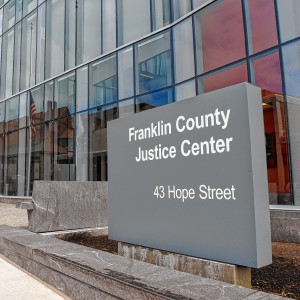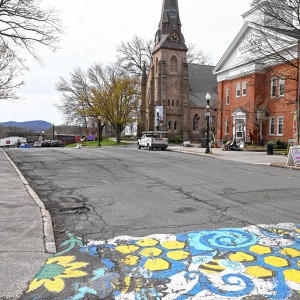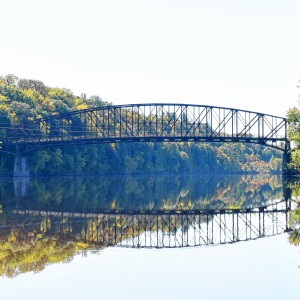Award-winning soil study strengthens Deerfield’s climate resiliency efforts
| Published: 01-04-2023 4:27 PM |
DEERFIELD — Just a few years after Deerfield became the first community in the state to be approved for the Municipal Vulnerability Preparedness Program (MVP), the town is again at the front lines of climate resiliency with an award-winning soil study.
With funding from an MVP grant, Deerfield joined forces with Chris Curtis, a consultant with the Greenfield-based planning agency Regenerative Design Group and Conservation Works, to study its soils, with a focus on how it can capture carbon and water to mitigate climate change.
Their findings, showcased in a 99-page Deerfield Healthy Soils report available on the town’s website, identified where Deerfield’s most fertile soils lie and what soils, particularly those on the town’s farmlands, are prime targets for regenerative measures. Keith Zaltzberg-Drezdahl, Regenerative Design’s managing director and head of planning, said soil plays a huge role in climate resiliency because it sequesters carbon and has a large water-storing capacity, which can reduce flooding.
“This project was part of several larger efforts to help communities around Massachusetts adapt to climate change to mitigate some of the worst effects and thrive into the future,” Zaltzberg-Drezdahl explained in a Zoom interview. “Soils are critical to the question of climate because of the way it interacts with both of the problems of climate change.”
Eric Giordano, a designer with Regenerative Design, said the agency used previously published mapping data on U.S. soils and analyzed land cover, such as forests, to “identify areas where the health and soil function is high” and which agricultural soils — some of which have been tilled for hundreds of years— could be regenerated through a variety of practices.
Giordano and Zaltzberg-Drezdahl said the upland ridges, like those in the northwestern areas of town, are largely covered in forests and while they may not be “productive” in the agricultural sense, they are excellent at capturing carbon and water.
“How can we raise the qualities of those soils to act like those high-functioning forest soils?” was one of the key questions guiding the report, according to Giordano.
That question led them to conduct outreach with several area farmers, as well as put together a soil health field day for Frontier Regional School’s science classes to conduct on-the-ground reporting. Curtis also laid out several sample bylaws designed to conserve soils that the town could pursue implementing. Such new bylaws could supplement green development bylaws and site plan review standards that were already adopted by Deerfield’s Planning Board.
Article continues after...
Yesterday's Most Read Articles
 Greenfield man arrested in New York on murder charge
Greenfield man arrested in New York on murder charge
 Former Leyden police chief Daniel Galvis charged with larceny
Former Leyden police chief Daniel Galvis charged with larceny
 Judge dismisses case against former Buckland police chief
Judge dismisses case against former Buckland police chief
 Greenfield Police Logs: April 9 to April 17, 2024
Greenfield Police Logs: April 9 to April 17, 2024
 Millers Meadow idea would ‘completely transform’ Colrain Street lot in Greenfield
Millers Meadow idea would ‘completely transform’ Colrain Street lot in Greenfield
 Greenfield’s Court Square to remain open year-round for first time since 2021
Greenfield’s Court Square to remain open year-round for first time since 2021
“I think the places where the town can most easily work is in the conservation realm and management realm,” Zaltzberg-Drezdahl said. “The town has been doing a lot of exciting work over the years. … Adding soil health into the considerations of all they’re doing is one way to attend to this and increase its effectiveness.”
For longtime Selectboard member Carolyn Shores Ness, who chairs the Franklin Conservation District and serves on the state Commission for Conservation of Soil, Water and Related Resources, the report is a step toward other towns in the state conducting similar projects.
“I’m on the workgroup that is trying to get the healthy soils action plan organized on the state level and implemented,” Shores Ness said. “We’re trying to align our healthy soils plan in Deerfield with what our situation is, and our situation is we have too much water.”
A wetter Deerfield, Shores Ness said, is a “drastic” change she has observed over her decades of work on the Planning Board and Selectboard.
“In that 40-year period, the water table has risen 18 to 20 inches and I have seen that myself,” Shores Ness said. “What we’re trying to do is figure out a plan to have healthier soils that absorbs the water, filtrates the water and releases the water when we have intense periods of drought.”
Shores Ness is hopeful the Deerfield Healthy Soils report inspires residents to take action on their property and their lawns, which, combined with town bylaws, can make a tangible impact.
“Our soil health action plan is really designed to say, ‘This is in your power to do something and cumulatively it will have an impact,’” she said.
In recognition of the partnership and the results it has produced, Deerfield was honored with a Sustainability Award from the Massachusetts branch of the American Planning Association during its Dec. 9 luncheon in New Bedford.
Shores Ness said it’s “very exciting to be recognized.” She is hopeful Deerfield’s work can provide a template for other communities around the state because soil health is an emerging climate resiliency topic and will be mainstream in the future, much like how recycling was originally “for hippies” and is now a common practice everywhere.
“This is exciting stuff we’re talking about that will be very impactful in the next 10 years,” Shores Ness said, noting she has already fielded calls from at least half a dozen other towns. “People are really excited talking to us and we want to keep that momentum going.”
Chris Larabee can be reached at clarabee@recorder.com or 413-930-4081.

 Photos: A musical classic returns
Photos: A musical classic returns Northfield appeals to Warren, Markey for Schell Bridge aid
Northfield appeals to Warren, Markey for Schell Bridge aid Prescription Drug Take Back Day set for Saturday in 15 communities in Franklin, Hampshire counties
Prescription Drug Take Back Day set for Saturday in 15 communities in Franklin, Hampshire counties
